Skip to main content
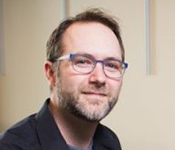 Allen School professor Jeffrey Heer received a Test of Time Award at the 2022 IEEE Visualization & Visual Analytics Conference this week, marking the third consecutive year that his work has been recognized with the honor.
Heer, the co-director of the Interactive Data Lab, co-authored the winning paper, “Enterprise Data Analysis and Visualization: An Interview Study,” which provided key insights into understanding how data analysts operate and the challenges they encounter in their workflows. The paper was… Read more →
Allen School professor Jeffrey Heer received a Test of Time Award at the 2022 IEEE Visualization & Visual Analytics Conference this week, marking the third consecutive year that his work has been recognized with the honor.
Heer, the co-director of the Interactive Data Lab, co-authored the winning paper, “Enterprise Data Analysis and Visualization: An Interview Study,” which provided key insights into understanding how data analysts operate and the challenges they encounter in their workflows. The paper was… Read more →
October 18, 2022
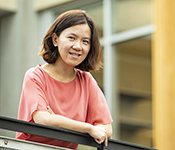 Science News has named professor Huijia (Rachel) Lin, a founding member of the Allen School’s Cryptography group, as one of its SN 10: Scientists to Watch. Each year, Science News recognizes 10 scientists who are making a mark in their respective fields while working to solve some of the world’s biggest problems. Lin earned her place on the 2022 list for achieving a breakthrough on what has been alternately referred to as the “holy grail” or “crown … Read more →
Science News has named professor Huijia (Rachel) Lin, a founding member of the Allen School’s Cryptography group, as one of its SN 10: Scientists to Watch. Each year, Science News recognizes 10 scientists who are making a mark in their respective fields while working to solve some of the world’s biggest problems. Lin earned her place on the 2022 list for achieving a breakthrough on what has been alternately referred to as the “holy grail” or “crown … Read more →
October 17, 2022
 The Allen School has established a new center at the University of Washington that aims to catalyze the next generation of cloud computing technology. The Center for the Future of Cloud Infrastructure, or FOCI, will cultivate stronger partnerships between academia and industry to enable cloud-based systems to reach new heights when it comes to security, reliability, performance, and sustainability.
“The first generation of the cloud disrupted conventional computing but focused on similar engineering abstractions, which is typical of many… Read more →
The Allen School has established a new center at the University of Washington that aims to catalyze the next generation of cloud computing technology. The Center for the Future of Cloud Infrastructure, or FOCI, will cultivate stronger partnerships between academia and industry to enable cloud-based systems to reach new heights when it comes to security, reliability, performance, and sustainability.
“The first generation of the cloud disrupted conventional computing but focused on similar engineering abstractions, which is typical of many… Read more →
October 14, 2022
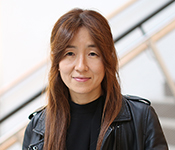 Yejin Choi (John D. and Catherine T. MacArthur Foundation)
Yejin Choi, a professor in the Allen School’s Natural Language Processing group, was selected as a 2022 MacArthur Fellow by the John D. and Catherine T. MacArthur Foundation to advance her work “using natural language processing to develop artificial intelligence systems that can understand language and make inferences about the world.” The MacArthur Fellowship — also known as the “genius grant” — celebrates and invests in talented and creative individuals… Read more →
Yejin Choi (John D. and Catherine T. MacArthur Foundation)
Yejin Choi, a professor in the Allen School’s Natural Language Processing group, was selected as a 2022 MacArthur Fellow by the John D. and Catherine T. MacArthur Foundation to advance her work “using natural language processing to develop artificial intelligence systems that can understand language and make inferences about the world.” The MacArthur Fellowship — also known as the “genius grant” — celebrates and invests in talented and creative individuals… Read more →
October 12, 2022
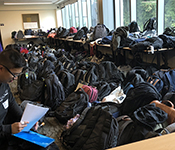 A sea of student backpacks stashed outside the October 4 career fair
After several years of Covid-induced online career fairs, the Allen School returned to an in-person format this fall!
On October 4 and 6, more than 50 companies — members of the Allen School’s Industry Affiliates program — came to campus to recruit students for full-time, part-time, and internship positions. On each day, the first half of the session was devoted to Allen School students; UW students in related… Read more →
A sea of student backpacks stashed outside the October 4 career fair
After several years of Covid-induced online career fairs, the Allen School returned to an in-person format this fall!
On October 4 and 6, more than 50 companies — members of the Allen School’s Industry Affiliates program — came to campus to recruit students for full-time, part-time, and internship positions. On each day, the first half of the session was devoted to Allen School students; UW students in related… Read more →
October 10, 2022
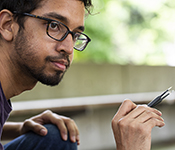 When bees leave the hive, they can spend all day flying and foraging on a single “charge” owing to their ability to convert fats and carbohydrates that store significantly more energy than batteries. When other insects traverse the landscape, the structure of their retinas combined with the motion of their heads enable them to efficiently take in and process visual information. And when dandelions shed their seeds, structural variations ensure that they are dispersed through the air over short and… Read more →
When bees leave the hive, they can spend all day flying and foraging on a single “charge” owing to their ability to convert fats and carbohydrates that store significantly more energy than batteries. When other insects traverse the landscape, the structure of their retinas combined with the motion of their heads enable them to efficiently take in and process visual information. And when dandelions shed their seeds, structural variations ensure that they are dispersed through the air over short and… Read more →
September 7, 2022
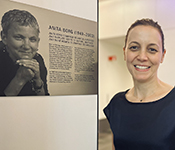 For Allen School professor Maya Cakmak, the future of robotics hinges on the human element. Since the early days of her research career, Cakmak has been leveraging advances in human-computer interaction and accessibility to shift robotics research from primarily technology-centric approaches toward a more user-centric approach. She is also known for putting people first through her support for programs and policies aimed at increasing participation in computing by women and people with disabilities. For her efforts, the Computing Research Association’s Committee on Widening Participation in Computing Research (CRA-WP) recently recognized Cakmak... Read more →
For Allen School professor Maya Cakmak, the future of robotics hinges on the human element. Since the early days of her research career, Cakmak has been leveraging advances in human-computer interaction and accessibility to shift robotics research from primarily technology-centric approaches toward a more user-centric approach. She is also known for putting people first through her support for programs and policies aimed at increasing participation in computing by women and people with disabilities. For her efforts, the Computing Research Association’s Committee on Widening Participation in Computing Research (CRA-WP) recently recognized Cakmak... Read more →
September 1, 2022
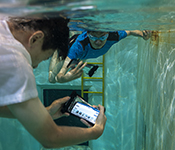 For millions of people who participate in activities such as snorkeling and scuba diving each year, hand signals are the only option for communicating safety and directional information underwater. While recreational divers may employ around 20 signals, professional divers’ vocabulary can exceed 200 signals on topics ranging from oxygen level, to the proximity of aquatic species, to the performance of cooperative tasks.
The visual nature of these hand signals limits their effectiveness at distance and in low visibility. Two-way text… Read more →
For millions of people who participate in activities such as snorkeling and scuba diving each year, hand signals are the only option for communicating safety and directional information underwater. While recreational divers may employ around 20 signals, professional divers’ vocabulary can exceed 200 signals on topics ranging from oxygen level, to the proximity of aquatic species, to the performance of cooperative tasks.
The visual nature of these hand signals limits their effectiveness at distance and in low visibility. Two-way text… Read more →
August 29, 2022
 Photo by Clay Banks on Unsplash
In the spring of 2020, people took to the streets — and to the tweets — in protest after a white police officer murdered George Floyd, a Black man, in Minneapolis by kneeling on his neck and back for over nine minutes. Black Lives Matter, a movement spawned seven years earlier following the shooting death of Trayvon Martin, an unarmed Black teenager, in Florida and the killer’s subsequent acquittal, emerged as the online and… Read more →
Photo by Clay Banks on Unsplash
In the spring of 2020, people took to the streets — and to the tweets — in protest after a white police officer murdered George Floyd, a Black man, in Minneapolis by kneeling on his neck and back for over nine minutes. Black Lives Matter, a movement spawned seven years earlier following the shooting death of Trayvon Martin, an unarmed Black teenager, in Florida and the killer’s subsequent acquittal, emerged as the online and… Read more →
August 24, 2022
 Victor Larracuente on Unsplash
For people around the world, technology eases the friction of everyday life: bills paid with a few clicks online, plans made and sometimes broken with the tap of a few keys, professional and social relationships initiated and sustained from anywhere at the touch of a button. But not everyone experiences technology in a positive way, because technology — including built-in safeguards for protecting privacy and security — isn’t designed with everyone in mind. In some cases,… Read more →
Victor Larracuente on Unsplash
For people around the world, technology eases the friction of everyday life: bills paid with a few clicks online, plans made and sometimes broken with the tap of a few keys, professional and social relationships initiated and sustained from anywhere at the touch of a button. But not everyone experiences technology in a positive way, because technology — including built-in safeguards for protecting privacy and security — isn’t designed with everyone in mind. In some cases,… Read more →
August 1, 2022
« Newer Posts — Older Posts »
 Allen School professor Jeffrey Heer received a Test of Time Award at the 2022 IEEE Visualization & Visual Analytics Conference this week, marking the third consecutive year that his work has been recognized with the honor.
Heer, the co-director of the Interactive Data Lab, co-authored the winning paper, “Enterprise Data Analysis and Visualization: An Interview Study,” which provided key insights into understanding how data analysts operate and the challenges they encounter in their workflows. The paper was… Read more →
Allen School professor Jeffrey Heer received a Test of Time Award at the 2022 IEEE Visualization & Visual Analytics Conference this week, marking the third consecutive year that his work has been recognized with the honor.
Heer, the co-director of the Interactive Data Lab, co-authored the winning paper, “Enterprise Data Analysis and Visualization: An Interview Study,” which provided key insights into understanding how data analysts operate and the challenges they encounter in their workflows. The paper was… Read more →

 Allen School professor Jeffrey Heer received a Test of Time Award at the 2022 IEEE Visualization & Visual Analytics Conference this week, marking the third consecutive year that his work has been recognized with the honor.
Heer, the co-director of the Interactive Data Lab, co-authored the winning paper, “Enterprise Data Analysis and Visualization: An Interview Study,” which provided key insights into understanding how data analysts operate and the challenges they encounter in their workflows. The paper was… Read more →
Allen School professor Jeffrey Heer received a Test of Time Award at the 2022 IEEE Visualization & Visual Analytics Conference this week, marking the third consecutive year that his work has been recognized with the honor.
Heer, the co-director of the Interactive Data Lab, co-authored the winning paper, “Enterprise Data Analysis and Visualization: An Interview Study,” which provided key insights into understanding how data analysts operate and the challenges they encounter in their workflows. The paper was… Read more →
 Science News has named professor Huijia (Rachel) Lin, a founding member of the Allen School’s Cryptography group, as one of its SN 10: Scientists to Watch. Each year, Science News recognizes 10 scientists who are making a mark in their respective fields while working to solve some of the world’s biggest problems. Lin earned her place on the 2022 list for achieving a breakthrough on what has been alternately referred to as the “holy grail” or “crown … Read more →
Science News has named professor Huijia (Rachel) Lin, a founding member of the Allen School’s Cryptography group, as one of its SN 10: Scientists to Watch. Each year, Science News recognizes 10 scientists who are making a mark in their respective fields while working to solve some of the world’s biggest problems. Lin earned her place on the 2022 list for achieving a breakthrough on what has been alternately referred to as the “holy grail” or “crown … Read more →
 The Allen School has established a new center at the University of Washington that aims to catalyze the next generation of cloud computing technology. The Center for the Future of Cloud Infrastructure, or FOCI, will cultivate stronger partnerships between academia and industry to enable cloud-based systems to reach new heights when it comes to security, reliability, performance, and sustainability.
“The first generation of the cloud disrupted conventional computing but focused on similar engineering abstractions, which is typical of many… Read more →
The Allen School has established a new center at the University of Washington that aims to catalyze the next generation of cloud computing technology. The Center for the Future of Cloud Infrastructure, or FOCI, will cultivate stronger partnerships between academia and industry to enable cloud-based systems to reach new heights when it comes to security, reliability, performance, and sustainability.
“The first generation of the cloud disrupted conventional computing but focused on similar engineering abstractions, which is typical of many… Read more →


 When bees leave the hive, they can spend all day flying and foraging on a single “charge” owing to their ability to convert fats and carbohydrates that store significantly more energy than batteries. When other insects traverse the landscape, the structure of their retinas combined with the motion of their heads enable them to efficiently take in and process visual information. And when dandelions shed their seeds, structural variations ensure that they are dispersed through the air over short and… Read more →
When bees leave the hive, they can spend all day flying and foraging on a single “charge” owing to their ability to convert fats and carbohydrates that store significantly more energy than batteries. When other insects traverse the landscape, the structure of their retinas combined with the motion of their heads enable them to efficiently take in and process visual information. And when dandelions shed their seeds, structural variations ensure that they are dispersed through the air over short and… Read more →
 For Allen School professor Maya Cakmak, the future of robotics hinges on the human element. Since the early days of her research career, Cakmak has been leveraging advances in human-computer interaction and accessibility to shift robotics research from primarily technology-centric approaches toward a more user-centric approach. She is also known for putting people first through her support for programs and policies aimed at increasing participation in computing by women and people with disabilities. For her efforts, the Computing Research Association’s Committee on Widening Participation in Computing Research (CRA-WP) recently recognized Cakmak... Read more →
For Allen School professor Maya Cakmak, the future of robotics hinges on the human element. Since the early days of her research career, Cakmak has been leveraging advances in human-computer interaction and accessibility to shift robotics research from primarily technology-centric approaches toward a more user-centric approach. She is also known for putting people first through her support for programs and policies aimed at increasing participation in computing by women and people with disabilities. For her efforts, the Computing Research Association’s Committee on Widening Participation in Computing Research (CRA-WP) recently recognized Cakmak... Read more →
 For millions of people who participate in activities such as snorkeling and scuba diving each year, hand signals are the only option for communicating safety and directional information underwater. While recreational divers may employ around 20 signals, professional divers’ vocabulary can exceed 200 signals on topics ranging from oxygen level, to the proximity of aquatic species, to the performance of cooperative tasks.
The visual nature of these hand signals limits their effectiveness at distance and in low visibility. Two-way text… Read more →
For millions of people who participate in activities such as snorkeling and scuba diving each year, hand signals are the only option for communicating safety and directional information underwater. While recreational divers may employ around 20 signals, professional divers’ vocabulary can exceed 200 signals on topics ranging from oxygen level, to the proximity of aquatic species, to the performance of cooperative tasks.
The visual nature of these hand signals limits their effectiveness at distance and in low visibility. Two-way text… Read more →


